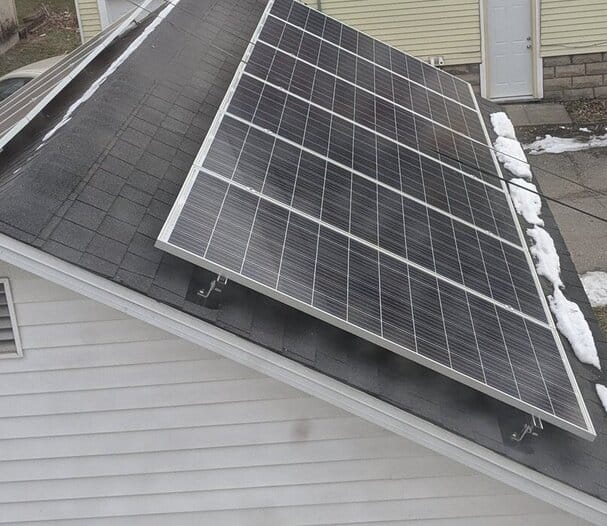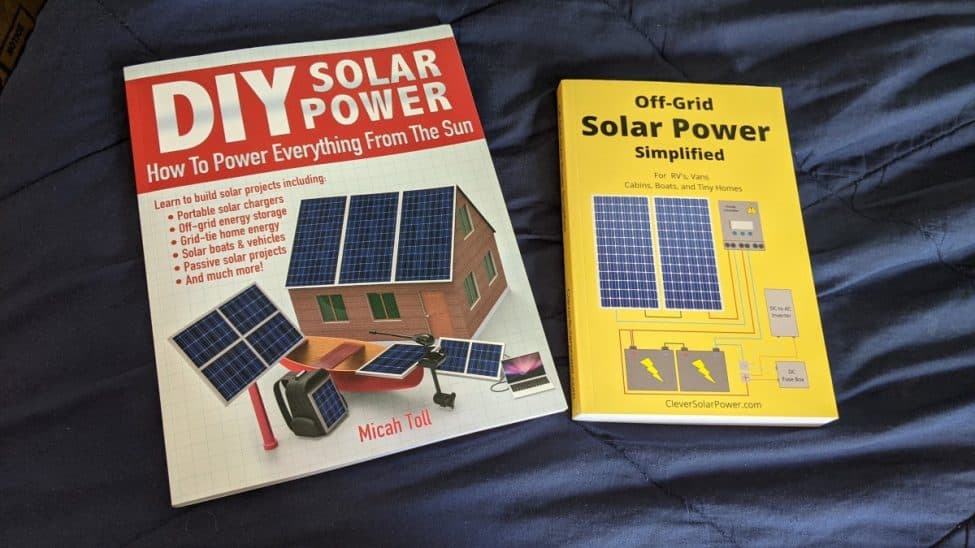As far as solar power has come over the last two decades, there are still undeniable limitations and that can sometimes cause confusion. Especially if you’re getting advice from people who are a decade or two out of the loop on solar. Is off the grid solar power in winter possible?
Beyond being possible, is it feasible to produce enough electricity via solar to stay off the grid in the winter months?
Getting by with solar power off the grid during winter is 100% viable in most locations. Good solar panel placement optimization, proper solar battery care, and careful rationing of less gathered power is important, but this is all very doable with good planning.
There are exceptions. A place like Fairbanks Alaska with 45 minutes of sunlight a day in the winter just doesn’t have enough light in winter for solar to be viable. If you’re approaching the Arctic, then common sense will let you know solar isn’t viable in your situation for winter.
Otherwise the short answer is yes, living off the grid with solar is completely feasible in the winter with the proper preparations.

Proper Solar Set Up for Winter Is Critical
Getting good results with solar during the summer months is easy. The key to getting the most out of your solar setup off the grid is to think about what the winter months are going to be like.
You are always going to get less energy per day per panel during the winter, even during bright days because the days in winter are simply much shorter. However, that doesn’t mean solar power during the winter isn’t viable because it is, as long as you do it right.
There are a couple ways you can do this to optimize your solar panel setup for the winter months.
If you’re calling in professionals for the installation process then this might not be as much of an issue, but if you are installing the panels yourself you may want to look at the Sun Curves tool to help you figure out how you want the panels set up for maximum energy production.
Because of the way the Earth tilts you may find that angling the solar panels one direction gets you the most power during summer, but you need to adjust them in another direction in order to get a lot more energy.
Movable arrays help make solar more viable for winter energy production since the panels can be moved to get a lot more light from the sun.
If this isn’t an option, another way to help out is to have some solar panels set up flat against the side of a building. While this doesn’t make much sense during summer, take a look after a snow storm (as this page rightly points out).
This at least keeps consistent power coming in, even if it’s not at the same level as peak summer hours. It is at least a lifeline.
Planning your off the grid solar setup for all seasons before you build is crucial to making sure it remains feasible throughout the darker and colder winter months.
Don’t forget that all-important pre-winter maintenance!
Your winter solar maintenance checklist:
- Test the generator
- Top off your battery bank with distilled water (if needed)
- Make sure your battery is properly insulated from the cold – upgrade it if you find potential issues
- Turn your inverter off if you leave the property for winter
- Adjust the solar panels for maximum catch
Realistic Power Expectations
This could also be called “do the winter” math – especially for those of you living in climates that get snow in the winter. You will still get energy through the solar panels, even on cloudy days, but it won’t be as much as spring, summer, and early autumn months.
This means that you can have enough power – if you keep track of how much power you have stored in your battery and make sure you’re rationing it out properly.
This may mean making compromises in the winter you don’t need to during the summer, but that doesn’t mean a cut in quality of life. Not if you do it right. If you plan well and make some minor adjustments (maybe solar lanterns with batteries versus actual lights) to make sure you don’t use too much energy then you will be fine.
But those realistic winter energy expectations need to be set early and maintained appropriately.
Managing Your Winter Power Needs
If you’re looking for even more real world examples of how to manage power needs in the winter with solar check out this amazing in-depth post by Accidental Hippies to learn more.
By keeping track of what uses how much energy, how much you can actually get during the winter (especially in non-optimal conditions) and planning accordingly you can still make solar energy work even during the darkest days of the year.
Proper Winter Solar Maintenance
There are various challenges with solar power in the winter. One big one is to make sure your batteries have an insulated and heated space especially if you live in an area where temperatures can dip below freezing.
This isn’t a big deal on the grid because the battery will be put in a house or heated room, but off the grid this is an issue if you don’t prepare properly.
Off The Grid Solar Maintenance in Winter Video
Back Up Generators
Many people point to the fact that pretty much every off-the grid location with solar has a back up generator as an example of why solar doesn’t work. By which I mean ignorant people who just don’t understand what long-term off the grid means.
Yes, you should have a back up generator to back up your solar panel setup. Just like you should have a back up generator for a windmill. Or even to a second generator. You should ALWAYS have backup generators when you’re living off the grid.
Solar energy can pull you most of the way through, and sometimes with proper setup and planning maybe the entire season, but you should always have a couple of emergency generators on hand to back up your needs just in case.
Off the Grid Winter Solar FAQ
Q: How do I keep solar batteries warm during the winter?
A: You need to keep them in a well insulated spot, preferably one by a heated area, like your cabin or main living space.
Q: Do solar panels still work when the grid goes down?
A: Yes, which is why they are a popular off the grid option. When you have an off the grid battery setup the panels keep on working the way they’re supposed to and you’re good to go.
Q: Are solar panels less effective in the winter?
A: Yes, due mostly because of much shorter days as well as the occasional snow fall that can block out light completely. However, it is worth noting that solar panels are more efficient in cold weather than hot weather and if you stay on top of removing the snow you should be in pretty good shape.
Q: Can I run everything off of solar power?
A: As long as your solar panels gather enough energy to meet your needs and you have more than enough batteries to store all the energy you need to make it through storms, long stretches of cloudy days, and darkness, then yes, absolutely.
Off the Grid Solar Power in Winter: What’s the Final Verdict?
While it does take a little bit of planning to make sure you go through winter without interruption, solar energy is a viable option through winter in most locations.
If you’re going to live off the grid you should know how to store energy, how to watch how much you’re using, and to adjust based on weather, season, or circumstances anyway. Solar gives you more than enough to make full winter living feasible and often with a minimum (if any) drop in comfort or quality of life.
While this may require a little extra planning in advance (see the strategy of flat solar panels against the side of a shed, out building, or house), you have the ability to set up a great solar rig that will keep your off the grid power working smoothly even during the long winter months.
Helpful Resources for Setting up Solar off the Grid
- DIY Solar Power Book – one of the best books out there, IMO
- Off-Grid Solar Power Simplified – the other DIY solar book I personally recommend
- TBD

